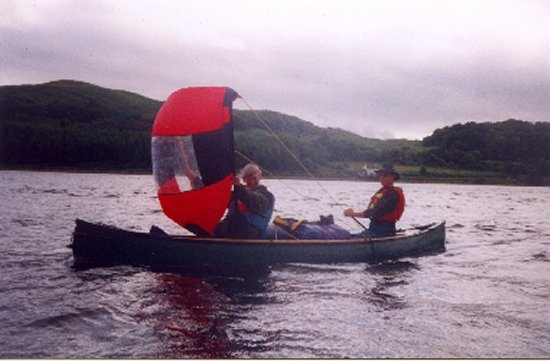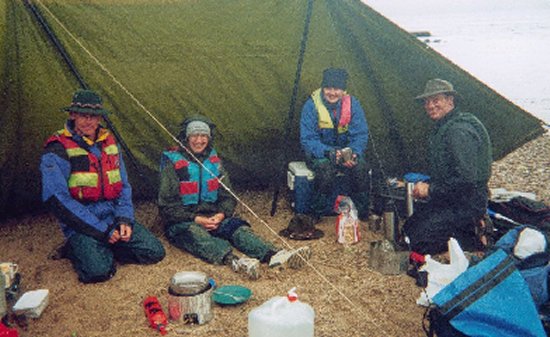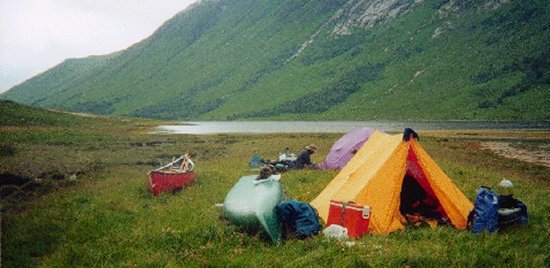 sails were replaced by some hard paddling and bailing as hefty side on waves
threatened to fill the canoes. As we rounded Aird's Point into the next
bay the waters calmed.
sails were replaced by some hard paddling and bailing as hefty side on waves
threatened to fill the canoes. As we rounded Aird's Point into the next
bay the waters calmed.I can remember standing on a stony beach, surrounded by orange seaweed, juggling with a set of clubs to keep the midges away. Seen through the spinning shapes, immense numbers of black dustbins bobbed in the evening water before me, stretching in vast lanes towards the distant reflected mountains. Behind me, on a grassy bank, three creatures with amorphous brown heads moved about slowly and deliberately between orange and purple tents, often stopping to flail the air or slap themselves! The smell of barbecued meat began to fill the bay and spread into the surrounding bracken and trees. The juggling and flailing stopped, and somehow we ate what was to be the first meal of our journey. The place where we ate was to become known for the rest of the trip, as 'Midgey Hollow' and I was already wondering if it was going to be difficult to be the only one without a mosquito headnet!
It had been a long and exciting day. As a novice canoeist, who has never canoe/camped before. I can remember that morning feeling distinctly alarmed as the piles of kit were jigsaw puzzled into the two canoes. Both of which somehow appeared to be very tiny indeed on the beach, in front of a sea whose surface bore no resemblance to the gentle waters of my limited river trip experiences!
We had camped overnight at Ganavan Bay campsite, a mile and a bit north of Oban, and now it was Sunday morning with an O.K. shipping forecast, and a tip from the campsite warden, indicating that the expedition was quite feasible, but slightly mad. I could tell though, as we set off that nobody felt conditions to be completely ideal, Alison wistfully offered the news that at 5 a.m. the sea had been like a millpond. Fastening my kneepads as the water banged and slapped within inches of the gunwales (or so it seemed from my angle in front) I felt it was fortuitous that my children were grown up and able to look after themselves!
There are many islands offshore from Oban, sometimes visible, and sometimes shrouded in mist, but for the first hour of this journey I didn't notice the scenery. The Eider Ducks which Mark pointed out seemed relatively unimportant compared to the job of paddling and keeping my bum in the middle of my seat. As we rounded the first headland, the waves and my head began to level and I allowed myself to take in the beauty of the situation. The sea, with its scattering of islands became the stage for a few white-sailed yachts from the local marina and it seemed more like a large lake. Large houses, half hidden by dark trees embroidered the mainland coastline to the right, whilst the uninhabited island hills on our left looked, from a distance, to be covered in mottled green velvet. There were sandy bays where we might have taken a break, but ahead lay The Falls of Lora and the choice between sweeping through with the tide or a long portage.
The road bridge at Connel spans these falls, and the day before had seen us underneath this bridge watching the boiling, bubbling torrents slowly but surely relax into a passable stream at high tide, the time of which differed considerably from the information in our tide timetable booklet. We had decided that it would be safe for up to two hours before high tide and a short half-hour after. To portage The Falls of Lora would be long and tortuous as we had brought no trolleys with us. On the day, with the wind behind us, we made such good speed that the bridge appeared more quickly than anticipated. Our timing by chance was perfect, and with some relief, we found ourselves happily paddling under the traffic and into the first half of the loch.
Loch Etive. This is what we had come here to do. The
understanding of it from the map, being that for most of its 25-mile length
there are no roads, therefore, no shops, no noise and no other people.
Our aim was to leave these things behind for a while and exchange the
worries of normal life for the basic tasks of finding drinking water, a pitch
for the tents, and either basking in the sun or searching out good walking.
We planned to paddle for two days to the head of the loch, have two free
days and then paddle back to Ganavan. It was of course a gamble, given
the moodiness of Scottish weather, but with the sails up, we roared
optimistically into our adventure, with me enjoying the views through a
transparent panel recently sewn into the sail. It may have been this part
of the day that Alison was referring to when later asked, "What do you remember
about today?" and her reply was; "Huge waves!" No-one denied that after a
while, it became too exciting, surfing and sailing at the same time and the
hastily lowered
 sails were replaced by some hard paddling and bailing as hefty side on waves
threatened to fill the canoes. As we rounded Aird's Point into the next
bay the waters calmed.
sails were replaced by some hard paddling and bailing as hefty side on waves
threatened to fill the canoes. As we rounded Aird's Point into the next
bay the waters calmed.
The loch is often a half to one and a half miles wide, with many bays and bends. Of course, when there is wind, this creates a wide variety of paddling conditions and the necessity to cross from one side to the other in order to find safer water, although this was not a decision to be taken lightly. The going was never boring. At times we would be floating on glass, with graceful orange jellyfish imponderably swimming by over jungles of olive glaucous seaweed, and then suddenly, the canoes would happily be bonking with the waves making us concentrate hard and chat little. For part of the way we enjoyed the fleeting visits of a seal.
'Midgey Hollow' had chased us out early the next morning. A billion midges decided that we would leave breakfastless, and after the scurry of packing up, we found ourselves surreally perched in a nothingness of white mist and complete stillness, eating the only things which weren't irretrievably packed away under all the bungy ropes and straps: - bananas and apples. Alison and Alistair sat in their canoe, looking as if they had been cut from a photo, and stuck on a sheet of white paper. Below us, in the depths, the bottom of the loch was covered in glimmering white starfish, and it was as if the world had reversed itself. As we paddled on air, the expected rugged mountains were hidden, like Brigadoon, in the soft wet whiteness. For a couple of hours, we had found our place with no noise and no people - except - what was this? A breeze and drizzle had increased visibility and through my rain streaked steamy glasses I could see some people watching us intently. Feeling quite proud of my adventure and knowing that they would be secretly admiring us, I wiped my glasses to discover that I had been preening my ego in front of a bunch of sou'westered shop mannequins, guarding the platforms of a fish farm from the birds and seals!
By early lunch time, on that second day, tired, wet, and lacking food, we
found a long beach and I looked forward at last to some tea and cornflakes.
Not so! The team had other ideas, and to my amazement, set about
building a bivi created from the ever-flexible design of Alistair and Alison's
'Plastic Palace' tent, in the shelter of which, Alison was to conjure up a hot
corned beef hash, and restore spirits. As I stood doing the important job
of holding a pole vertical, I felt rather humble in the face of all this
ingenuity and stalwartness, and was glad that Mark
 decided to catch the occasion on film. And here happened another unreal
moment. He paused, his finger about to press the button on the camera,
looked beyond the bivi, disappeared and returned with a beautiful young woman
carrying a fishing rod, who smilingly snapped us all and disappeared into the
distance as silently as she had come. The Lady of the Loch?
decided to catch the occasion on film. And here happened another unreal
moment. He paused, his finger about to press the button on the camera,
looked beyond the bivi, disappeared and returned with a beautiful young woman
carrying a fishing rod, who smilingly snapped us all and disappeared into the
distance as silently as she had come. The Lady of the Loch?
That Monday afternoon was a mixed memory of peering into glass like water at tangly water weeds and shrimps, or paddling like mad in conditions which were later variously described as 'more lively' or 'terrifying'! As the rounded end of the loch came into view, I believe that we paddled faster in anticipation. There was such a strong wind as the canoes were unpacked and the tents set up, that I, for one, was wondering how we were possibly going to get back down the loch, in the face of it, should it continue for our return. The setting up of the toilet tent was a comforting touch after two days of crouching behind bracken, and the 'Palace' tent, this time raised in all its glory, provided welcome communal shelter for the second hot meal of the day. But not until after the kites came out and were flown triumphantly over the scene, as everyone relaxed after what had been some serious paddling. Our attempts to send the canoe sail aloft with buoyancy aids as weights failed - what else? - But we had to try, didn't we! The wind had to be good for something other than keeping us awake half the night!
Tuesday morning brought calm, no midges, and enough view through the
curtains of mist to realize that our encampment looked thrillingly small under
the looming mass of Ben Starav. The valleys and hills at the end of this
loch offer some truly beautiful walking that includes the chance to see some
rare and endangered Caledonian pine trees in all their twisted maturity.
Water tumbles off the sides of these mountains, through, over, and around
natural pink and white slalom courses. Tons and tons of spraying,
frothing, thundering clear liquid pours over steep
 falls, smoothing the rocks into many natural smooth basins which are perfect
for cooling down in when the sun is hot, as it was for us that day.
Sweaty, hot, and smelly from the lack of the opportunity to wash, we
plunged gratefully into one of the valley's river Jacuzzis, and felt that life
was good.
falls, smoothing the rocks into many natural smooth basins which are perfect
for cooling down in when the sun is hot, as it was for us that day.
Sweaty, hot, and smelly from the lack of the opportunity to wash, we
plunged gratefully into one of the valley's river Jacuzzis, and felt that life
was good.
Our retraced footpath led us back to midges and the shocking sight of a large group of people gathered within a stone's throw of our camp. Had we unwittingly found a tourist spot? What a relief to discover that it was just a harmless group of inner city Glaswegian teenagers! Full of questions, especially "What football team do you support?" their chirpy presence was soon removed back to a bothy, one and a half miles up the valley, by their supervisors, who were planning such activities as raft building for the following day. Had they stayed, they would have witnessed the sight of four people hastily putting out canoes on a silver loch, slipping and sliding over seaweed with wine, plates, and lethally hot saucepans of chili and rice, in a successful attempt to escape from the midges. The evening that followed was voted everyone's favourite moment, with the help of a little wine we drifted aimlessly on the loch with our boats tied together with mackerel lines trailing, believing ourselves to be in heaven.
The whole of the following day, Wednesday, was voted to be everyone's worst moment. Heavy rain all night, which continued through the day, had created soggy, splishing conditions underfoot. The thoughts of rising water levels in the river and an advancing tide pushed up by a strong wind reaching the tents didn't help. The midges were relentless, and the bothy boys up the valley, having given up any pretence of enjoying the outdoor life, were delimbing toads and - I won't go on! We all dealt with the day's problems in our own way, in between collecting, purifying and boiling mountain stream water ready for the return journey. The mobile phones were picking up no signals but yesterday, Mark's binoculars had picked out the redness of a phone box several miles away across the river valley, and he had set himself the task that morning of making sure it was reachable. That evening the barbecue was lit using a flint, steel, and cotton wool teased out with Vaseline. No - we hadn't soaked the matches, we were just trying to cheer ourselves up a little as Alistair gamely cooked pan baked bread to accompany our evening meal which Alison produced from a brilliantly organized food box. As we tried to relieve the painful midge monotony with painful stinging eyes by putting wet wood on the fire, we were treated to the sight of a magnificently antlered stag that came to drink from the nearby river. I must have looked worried, because a thoughtful Mark informed me that there were possible, but expensive and longwinded plans B, C, D, and E, should the wind still be raging in the wrong direction for our journey the next morning. Seen as part of a holiday, the day had been disappointing, but on a scale of happiness the putting on of dry socks before climbing into the sleeping bags that night, would have to score top marks.
Have you noticed that whatever the good intentions are, it always seems to take about two hours to have breakfast, pack up and go when canoe/camping. Not so that morning! On discovering through the tent flaps that the midges were still there in force, the water was flatter than flat, and a patch of blue sky was beckoning in the direction we were planning to travel, we were in the boats and underway, admittedly without breakfast again, for 8.30 a.m. Feeling rather hungry, we made excellent progress in contemplative silence. The sun led us to a breakfast stop and revealed a tiny species of sundew, as well as lifting the cloud so that we could see the mountains that had been so invisible to us on the trip up. With the early start and frequent rest stops in sheltered bays, we were unrushed, and able to choose a promising and picturesque campsite, which left a much shorter distance to cover on the final day, should the weather turn against us. The complete absence of midges was seen as miraculous, but later attributed to a beach alive with toads and frogs. The Hound of the Baskervilles, barking harshly in the woods behind, was, in fact, the unnerving sound of a rutting red deer stag. The bay was spectacular with purple thistles and elegant swaying yellow grasses and we were in a mood to let nothing spoil this, our final night. But then! Alistair found a tic embedded in his leg - and then another, and another, and we all had an uncomfortable feeling! By now, I was beginning to suspect that long relaxed breakfasts were not to be a feature of this adventure, and took the precaution of stashing a buttie in the pocket of my waterproof ready for the next morning.
Sure enough, after a fairly sleepless night, we were up and away with the local Buzzard. The final stretch was welcomed with mixed feelings, mainly because of the discomfort sustained over the week from insect bites. For some reason, I had suffered less and was able to enjoy the perfect conditions itch free. We expected problems back at The Falls of Lora, with racing water meaning a portage or a good walk to fetch the cars, but instead we flowed under the bridge, onto a sea which resembled the covers on a freshly made bed. The wind sock, the sky, and the weather report on the mobile from Ganavan, all indicated that this time I would be able to paddle on the sea with my heart in its correct place, and not in my mouth. The Eider Duck claimed my full attention and the West Highland "Tystie" were properly acknowledged. On sighting the lighthouse off Mull we knew that we were close to Ganavan Bay, our final landing place and as we watched the enormous ferry entering the harbour at Oban, a short distance along the coast, our two tiny boats came to rest on the beach at Ganavan.
Written by Heather Stacey.
Thanks must go to Alison Cooke for putting together an excellent menu and an over stocked food box.